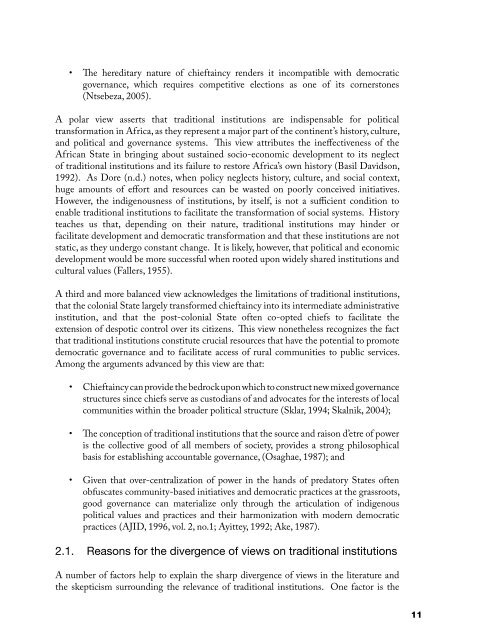Relevance of - United Nations Economic Commission for Africa
Relevance of - United Nations Economic Commission for Africa
Relevance of - United Nations Economic Commission for Africa
Create successful ePaper yourself
Turn your PDF publications into a flip-book with our unique Google optimized e-Paper software.
• The hereditary nature <strong>of</strong> chieftaincy renders it incompatible with democratic<br />
governance, which requires competitive elections as one <strong>of</strong> its cornerstones<br />
(Ntsebeza, 2005).<br />
A polar view asserts that traditional institutions are indispensable <strong>for</strong> political<br />
trans<strong>for</strong>mation in <strong>Africa</strong>, as they represent a major part <strong>of</strong> the continent’s history, culture,<br />
and political and governance systems. This view attributes the ineffectiveness <strong>of</strong> the<br />
<strong>Africa</strong>n State in bringing about sustained socio-economic development to its neglect<br />
<strong>of</strong> traditional institutions and its failure to restore <strong>Africa</strong>’s own history (Basil Davidson,<br />
1992). As Dore (n.d.) notes, when policy neglects history, culture, and social context,<br />
huge amounts <strong>of</strong> ef<strong>for</strong>t and resources can be wasted on poorly conceived initiatives.<br />
However, the indigenousness <strong>of</strong> institutions, by itself, is not a sufficient condition to<br />
enable traditional institutions to facilitate the trans<strong>for</strong>mation <strong>of</strong> social systems. History<br />
teaches us that, depending on their nature, traditional institutions may hinder or<br />
facilitate development and democratic trans<strong>for</strong>mation and that these institutions are not<br />
static, as they undergo constant change. It is likely, however, that political and economic<br />
development would be more successful when rooted upon widely shared institutions and<br />
cultural values (Fallers, 1955).<br />
A third and more balanced view acknowledges the limitations <strong>of</strong> traditional institutions,<br />
that the colonial State largely trans<strong>for</strong>med chieftaincy into its intermediate administrative<br />
institution, and that the post-colonial State <strong>of</strong>ten co-opted chiefs to facilitate the<br />
extension <strong>of</strong> despotic control over its citizens. This view nonetheless recognizes the fact<br />
that traditional institutions constitute crucial resources that have the potential to promote<br />
democratic governance and to facilitate access <strong>of</strong> rural communities to public services.<br />
Among the arguments advanced by this view are that:<br />
• Chieftaincy can provide the bedrock upon which to construct new mixed governance<br />
structures since chiefs serve as custodians <strong>of</strong> and advocates <strong>for</strong> the interests <strong>of</strong> local<br />
communities within the broader political structure (Sklar, 1994; Skalnik, 2004);<br />
• The conception <strong>of</strong> traditional institutions that the source and raison d’etre <strong>of</strong> power<br />
is the collective good <strong>of</strong> all members <strong>of</strong> society, provides a strong philosophical<br />
basis <strong>for</strong> establishing accountable governance, (Osaghae, 1987); and<br />
• Given that over-centralization <strong>of</strong> power in the hands <strong>of</strong> predatory States <strong>of</strong>ten<br />
obfuscates community-based initiatives and democratic practices at the grassroots,<br />
good governance can materialize only through the articulation <strong>of</strong> indigenous<br />
political values and practices and their harmonization with modern democratic<br />
practices (AJID, 1996, vol. 2, no.1; Ayittey, 1992; Ake, 1987).<br />
2.1. Reasons <strong>for</strong> the divergence <strong>of</strong> views on traditional institutions<br />
A number <strong>of</strong> factors help to explain the sharp divergence <strong>of</strong> views in the literature and<br />
the skepticism surrounding the relevance <strong>of</strong> traditional institutions. One factor is the<br />
11
















